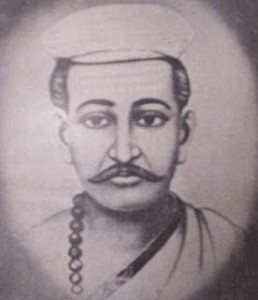 Known for his love songs and poetry, Vidyapati was born 1352 in Bisfi, India. His name comes from Sanskrit and denotes a man of learning or knowledge and his poetry was a great influence on many writers over the following centuries. Often written in the Maithili dialect, the 100s of poems collected together in the Padavalli often explore the love between Krishna and Radha and are still sung in parts of the district today.
Known for his love songs and poetry, Vidyapati was born 1352 in Bisfi, India. His name comes from Sanskrit and denotes a man of learning or knowledge and his poetry was a great influence on many writers over the following centuries. Often written in the Maithili dialect, the 100s of poems collected together in the Padavalli often explore the love between Krishna and Radha and are still sung in parts of the district today.
Around 1370, Vidyapati received his first commission from the King of Mathili and wrote a poem that praised his physical prowess which was so successful that he stayed on at court, providing political and religious guidance through the medium of poetry for the King’s son. From 1380 for the next 26 years, he began to write his series of poems about Krishna and Radha.
Whilst his poetry followed the traditions of his predecessors and the style that had been around since the birth of Kalidasa, Vidyapati was the first to write in the Maithili dialect. The conventions of the time stated that in verse the woman’s eyes are always wide and tender and her skin is smooth and likened to a lotus leaf. Vidyapati took these basic constructions of Indian poetry and added his own particular spin.

His life has been colored by much folklore so it is difficult to find the truth about the poet but many stories abound of his life, including that he was such a devotee of Shiva that the god visited him as a servant in his house. Vidyapati wrote a number of songs and verses in praise of his god Shiva and it is said that the servant stayed with him for many years, helping him in a number of difficult situations. Many people who still worship Shiva do so by singing the songs of Vidyapati.
One of the main areas that Vidyapati influenced was the future BengaLi Poets who imitated his verses about the love of Krishna and Radha. It even led to the development of a new poetic language in Brajabuli in the 16th Century. But Vidyapati wasn’t just writing about love and romance, he covered topics that varied from law and history to the ethical issues facing people at the time. He also produced some more autobiographical works such as Vibhāgasāra.

As with most of his life, Vidyapati’s death was also shrouded in folklore. It was said that, when he realized that his time was coming to a close, he set about to end his days on the Ganga and that the river separated to show him where to lie. Where he died a Shiva lingam, or sign of Shiva, rose up and is there to this day. Since then, Vidyapati’s work has been explored and dissected by many scholars and literary greats including Champati Ray and Pratap Dev. He has often been seen as the Indian equivalent of Chaucer and Dante.

